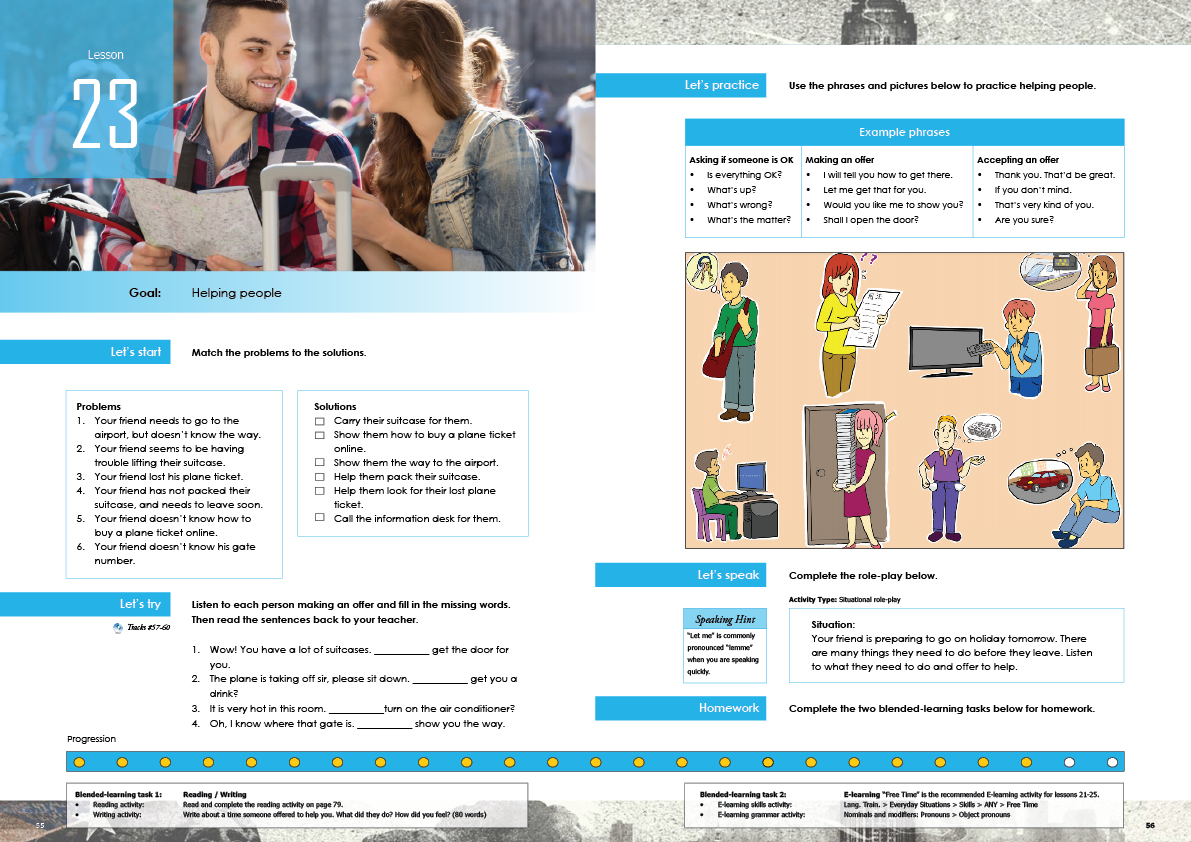
Manuals > General English > Rosetta Stone Advantage > Elementary - Book 2 > Lesson 23
< Previous Lesson | Next Lesson >

By the end of the lesson, the student should be able to help people.
Communication strategies:
The student should be able to offer to help someone using the following strategy:
1) ask if someone is OK
2) listen to the problem
3) offer a solution
e.g.
A) Is everything OK?
B) I think I lost my car keys.
A) Shall I help you look for them?
B) Thank you. That would be great.
Words and rules:
- The student should be able to extend offers e.g. Shall I help you?
- The student should be able to accept offers e.g. That would be great.
- The student should be able to decline offers e.g. No thank you. I've got it.
Appropriateness:
Non-verbal behaviour: NA
Register: When helping someone you don't know, a casual register is usually used as we want to sound friendly e.g. Hi, can I give you a hand with something?.
Social rules: You don't need to accept an offer if you don't want to. e.g. Shall I carry your bag? No, it's OK. I got it.
Cultural references: NA
Track #57
Wow. You have a lot of suitcases. Let me get the door for you.
Track #58
The plane is taking off sir. Please sit down. Can I get you a drink?
Track #59
It is very hot in this room, shall I turn on the air conditioner?
Track #60
Oh, I know where that gate is. I’ll show you the way.
Because the lesson touches on the topic of problems, you are welcome to introduce some of the following vocabulary if you like.
1) to lose something (v)
2) to operate something (v)
3) to be broke (adj)
4) to translate something (v)
5) to have a hard time doing something (v)
6) to find something difficult (v)
7) to misplace something (v)
8) to forget something (v)
9) to find something (v)
10) to miss a train (v)
Option 1:
Difficulty ★
Type:
Let's start - Warm-up discussion
Purpose:
Steering the student into the goal of the lesson before opening the book.
Method:
Before you open the book, discuss some times other people have helped you, or you have helped other people.
Option 2:
Difficulty ★★
Type:
Let's practice - Vocabulary introduction
Purpose:
Practicing how to extend, accept and decline offers.
Method: Model and practice the content below with the student.
Extending offers
- Shall I + verb
- Would you like me to + verb
- Do you want me to + verb
- Can I + verb
- I’ll + verb
- Let me + verb
Accepting
- Thank you.
- Yes, please
- That would be great / lovely
- If you don’t mind.
Declining
- No, thanks / thank you
- Don't worry
(using I’m)
- I'm fine / I'm cool / I'm ok
(using it’s)
- It's fine / It's ok / It's cool
(expressions)
- I've got it / I got it.
- I can manage
- No help required
- I can do it myself.
Option 3:
Difficulty ★★
Type:
Let's practice - Less controlled practice
Purpose:
Teaching the student how to extend offers
Method: State you have a problem, then the student has to come up with an offer.
e.g.
A)
I'm cold.
B) Shall I get you a blanket?
Extra questions you might like to ask in the lesson
Offering assistance
- Can I give you a hand?
- Can I help you with that?
- Need a hand?
Let’s start
Match the problems to the solutions.
1) Your friend needs to go to the airport, but doesn’t know the way.
Show them the way to the airport.
2) Your friend seems to be having trouble lifting their suitcase.
Carry their suitcase for them.
3) Your friend lost his plane ticket.
Help them look for their lost plane ticket.
4) Your friend has not packed their suitcase, and needs to leave soon.
Help them pack their suitcase.
5) Your friend doesn’t know how to buy a plane ticket online.
Show them how to buy a plane ticket online.
6) Your friend doesn’t know his gate number.
Call the information desk for them.
Let’s try
1) Let me
2) Can I
3) Shall I
4) I’ll
Let’s practice
Picture of someone thinking about lots keys
A) Hi. What’s wrong?
B) I can’t find my keys.
A) I’ll help you find your keys.
B) Thanks a lot.
Problems
I can’t read this - I’ll translate it for you
I don’t know how to use this - I’ll show you
I don’t know which train to catch - I’ll show you
I can’t connect to the internet - I’ll fix it for you
I can’t open the door - I’ll open it for you
I don’t have any money - I’ll lend you some
I don’t have a car - I’ll give you a lift
Let’s speak
Helping someone with stuff they need to do before they go on a holiday.
A) Hey Dan. What’s up?
B) I’m going on holiday tomorrow, but there is so much stuff I need to do before I go.
A) Like what?
B) Well, I need to finish packing my suitcase. Clean my house. Ask someone to take care of my cat, double check the departure times, and find my passport.
A) Wow! That’s a lot. Well, I’m going to be home this week, so would you like me to take care of your car?
B) Are you sure?
A) Yeah it’s fine. And I’m not doing anything this afternoon, so I’ll give you a hand cleaning the house and maybe we can find your passport.
B) Thanks so much. You’re a lifesaver.
A) You’re welcome.